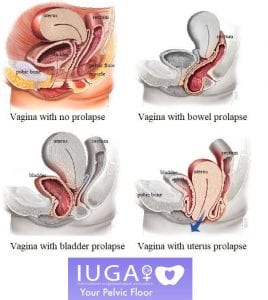The Blog
What is a Pelvic Organ Prolapse (POP)?

What is it a Pelvic Organ Prolapse (POP)?
Pelvic Organ Prolapse occurs when one or more of your pelvic organs descend close to or beyond the entrance of the vagina. The pelvic organs that may descend include the uterus, bowel and/or bladder. Once of the causes can be weakening of the pelvic floor muscles, ligaments and fascia (connective tissue).
What symptoms can you feel with a POP?
- Feeling of heaviness or dragging in the vagina.
- Feeling of a bulge in the vagina or outside the vagina.
- Urinary symptoms such as feeling that you are not fully emptying your bladder or having a slower urinary stream than usual. Also, you could have urinary frequency or urgent desire to pass urine, and leakage of urine on the way to the toilet or with other activities such as coughing, sneezing, etc.
- Bowel symptoms such as feeling of not emptying properly and/or needing to press on the vaginal wall to empty the bowel or having difficulties to open your bowels.
- Discomfort or pain with penetration and during/after sexual intercourse.
What causes POP?
The main cause is weakening of the pelvic floor muscles, damage to the nerves of those muscles and damage to the ligaments and fascia which support the pelvic organs. There are many things that can contribute to the damage of those structures, for example:
- Pregnancy and childbirth. Prolapse affects about one in two women who have had one or more vaginal deliveries. A prolapse may occur during or shortly after a pregnancy or may take many years to develop with the summation of other contributing factors.
- Aging may cause further weakening of the pelvic floor structures.
- Menopause which can affect the vaginal mucosa and its support to the organs.
- Conditions that cause excessive pressure on the pelvic floor like obesity, chronic respiratory conditions, chronic constipation, heavy lifting and straining.
- Some women may have an inherited risk for prolapse, while some diseases affect the strength of connective tissue, e.g. Marfan syndrome and Ehlers-Danlos syndrome.
However, it is important to emphasize that only 1 out of 9 women (11%) will ever need surgery for prolapse in their lifetime.
How can Pelvic Health Physiotherapists Help?
The support of your organs inside your pelvis are like the support that a ship would have in the port: it is held by the strings and lifted by the water. In our case, those strings holding are the ligaments and fascia, which are passive structures (they can’t contract, we can’t modify their position) and the water is the pelvic floor muscles giving support from underneath. If your pelvic floor muscles are not strong enough to provide your organs with the necessary support, the organs may descend and support is only provided by ligaments. Over time these ligaments will become more flexible and offer less and less support. Hence, your organs support depends on the ability of your pelvic floor muscles to contract.
Teaching you how to contract properly and efficiently your pelvic floor muscles is in the scope of a pelvic health physio. Therefore, if you are having symptoms, one of our pelvic health physios could help you to minimize any contributing factors to the prolapse and will show you how to correctly activate your pelvic floor muscles. They will also provide education on how to manage your prolapse and provide guidance on how to get back to activities you love.


